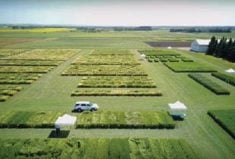Kevin Serfas had to change his way of thinking when he decided to expand his farm near Lethbridge.

“One thing we’ve learned along the way is that we can’t run the farm by ourselves anymore,” said Serfas, who runs a 56,000-acre grain operation and 6,000-head feedlot with his father and brother.
“We had to realize and accept that if we wanted to move forward, we had to let other people do things we really enjoyed doing. The sooner we were able to grasp that concept, the better off we were.”
At any given time, Serfas Farms has a mix of more than 40 seasonal, part-time, and full-time staff on the operation — and building a workforce like that is “not for the faint of heart.”
“It takes discipline not to lose your mind at everything that doesn’t go to plan,” said Serfas, who spoke at FarmTech in late January.
Read Also

Farming Smarter receives financial boost from Alberta government for potato research
Farming Smarter near Lethbridge got a boost to its research equipment, thanks to the Alberta government’s increase in funding for research associations.
“Everybody knows how expensive farm machinery is. It’s a huge change in thought process to let other people run this stuff when generally the largest piece of machinery they’ve run to that point is a lawn mower.
“Stuff is going to get broken and people are going to do stupid things.”
But how has the Serfas family managed to build such a robust workforce in an industry that routinely struggles to attract workers?
Easy: “Make your farm somewhere people want to come.”
“You’ve got to make your farm a great place to work,” said Serfas, adding he can’t remember the last time he had to actively recruit a full-time employee.
“It really isn’t about money because — let’s be honest — if it was, we wouldn’t have anybody working for us.”
Most farm employers have more to offer prospective employees than money — but they don’t sell their “total compensation package,” said human resources consultant Margot Ross Graham.
- Read more: Make your farm an international destination
“Often people are worried about recruiting from the perspective that they can’t pay as much — that they can’t give them what their competitor can give them,” said Ross Graham, who also spoke at the conference.
“You can’t always compete on money, but you can compete on experience, flexibility, bonus structures. You can actually create a different environment for your workers that may outweigh the money.”
Customized employee benefits
So sell your total package, said Ross Graham.
“What are your benefits? What are your flexibilities? What can you offer — later start times, condensed work weeks, things that might suit the needs of the individual?” she said.
“If you’ve got a small operation, customize it to the needs of your workforce. You need to think about what is fair, not necessarily equal. Employees are not all the same, so why treat them all the same if you don’t have to?”
One way the Serfas family has done that is by putting some long-term employees on a salary.
“It’s a win-win proposition,” said Serfas. “It gives them more of a sense of security financially, and for us, it’s great because when we don’t have work, we just tell them to go home. They’re getting the same pay no matter what.
“When you find the right people — the loyal people, the guys who always are looking for more work — they really do appreciate it.”
Little things like that go a long way in creating employee engagement, which can reduce turnover and increase productivity, said Ross Graham.
“Engaged employees create profitable organizations,” she said. “It does not matter what business you’re in. Engaged employees are those employees who have a connection with their organization. It’s really built on the relationship that they’ve built.”
Serfas has seen that first hand in his own operation. The day before harvest, for example, the family takes all of their employees to the lake for a barbecue.
“People want to feel like they’re valued, like they’re part of something. It really makes them feel like they’re not just coming to work, getting a cheque, and going home. They’re actually involved in something.”
It’s about “capturing the heart and soul of your employees,” added Ross Graham.
“You are in a tough industry. It’s going to be hard for you to get people. But if you can create an experience, you will keep your people, versus giving them something hoping that they’ll stay.”















